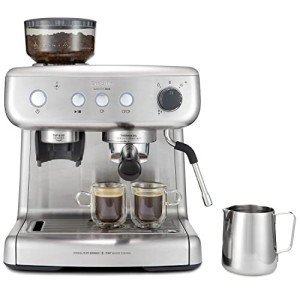20 Things You Should Know About Home Use Espresso Machines
Home Use Espresso Machines: A Comprehensive Guide
Espresso machines have become a staple in lots of families as coffee lovers seek to replicate café-quality brews in the convenience of their kitchen areas. The rise in appeal has actually caused a varied market filled with numerous models, features, and costs. This article aims to offer an informative overview of home use espresso machines, assisting readers browse their alternatives successfully.
Understanding Espresso Machines
Espresso machines work by requiring hot water through finely-ground coffee under high pressure, leading to a concentrated coffee drink called espresso. There are several types of espresso machines classified based upon their developing approaches and level of automation. The most common types consist of:
Manual Espresso Machines: These require the user to control the pressure and water flow, allowing for a more hands-on coffee-making experience.
Semi-Automatic Espresso Machines: These use automatic control over water pressure, while the user by hand grinds and tamps the coffee.
Automatic Espresso Machines: With the push of a button, these machines automatically manage the flow of water, making it easier to brew espresso with constant results.
Super-Automatic Espresso Machines: These all-in-one machines manage grinding, tampering, developing, and even milk frothing, making them ideal for users trying to find benefit.
Pill or Pod Machines: These use pre-packaged coffee pods to create espresso with very little effort, however they limit choice in developing techniques and tastes.
Table: Comparison of Espresso Machine Types
Type
Control Level
Alleviate of Use
Cleaning up Level
Suitable For
Manual
User-controlled
Moderate
High
Coffee perfectionists
Semi-Automatic
Partial automation
Moderate
Moderate
Home baristas
Automatic
Completely automated
Easy
Low
Busy individuals
Super-Automatic
Totally automated
Really simple
Extremely low
Convenience hunters
Capsule/Pod
Totally automated
Extremely easy
Very low
Casual drinkers
Key Features to Consider
When picking a home use espresso machine, it's vital to think about different features that can considerably affect the quality of espresso and user experience.
Pressure: Look for machines that offer at least 9 bars of pressure, as this is thought about ideal for brewing espresso.
Boiler Systems: Single vs. dual boiler systems identify temperature level stability and the ability to brew espresso and steam milk all at once.
Grinder: Integrated mills enable newly ground coffee, which boosts taste. Consider Get Source with adjustable grind settings.
Milk Frother: For those who take pleasure in coffees and lattes, an integrated steam wand or automatic frother is vital.
Size and Design: Consider your kitchen area space and aesthetic preferences. Machines are available in different sizes, from compact to large setups.
Price: Home espresso machines can range from a few hundred to a number of thousand dollars, so it's essential to develop a budget before checking out choices.
Pros and Cons of Home Use Espresso Machines
Pros
Cons
Benefit of brewing coffee in the house
Initial investment can be high
Quality of espresso is frequently remarkable
Requires some skill, particularly with manual machines
Capability to experiment with flavors
Upkeep and cleansing can be labor-intensive
Can conserve cash in the long run
Not all machines will fit every coffee choice
Maintenance and Cleaning Tips
Maintaining an espresso machine is important for prolonging its life and making sure consistent brew quality. Here are some useful tips:
Regular Descaling: Minerals from water can develop in the machine. Descale every 1-3 months, depending on water hardness.
Daily Cleaning: Rinse portafilters, baskets, and steam wands after each use to avoid coffee oils from building residue.
Use Filtered Water: This can help in reducing mineral accumulation and improve the taste of coffee.
Replace Gaskets and Seals: These elements might break with time and ought to be changed to keep pressure and efficiency.
Read the Manual: Each machine has particular care guidelines; following these will guarantee durability.
FAQs About Home Use Espresso Machines
**Q1: What is the very best budget espresso machine?The best budget espresso machine often depends on specific requirements, however models like the DeLonghi EC155 or the Breville Bambino are popular among users for supplying terrific worth. Q2: How long do home espresso machines usually last?With proper upkeep, home espresso machines can last anywhere from 5 to 15 years, depending on the quality of the machine and frequency of use. Q3: Can I make coffees and lattes with any espresso machine?While most espresso machines can make coffees and lattes, having a reliable
steam wand or frother is important for achieving the best milk texture.
Q4: Are super-automatic machines worth the investment?For those who prioritize benefit and fast brewing, super-automatic machines can be worth the investment, though they might lack some customizability in brew strength and taste. Q5: What types of coffee beans are best for espresso?While personal preference contributes, beans identified as” espresso “blends are generally roasted darker, developing abundant flavors and a creamy texture when brewed.
Buying a home espresso machine can change the everyday coffee regimen into something unique, raising home brews to café quality. By understanding the various types of machines, crucial functions to think about, maintenance requirements, and weighing the
advantages and disadvantages, customers can make educated decisions that suit their specific preferences. As the espresso culture continues to grow, no matter the choice, every brew can be a scrumptious experience waiting to be relished.  **
**